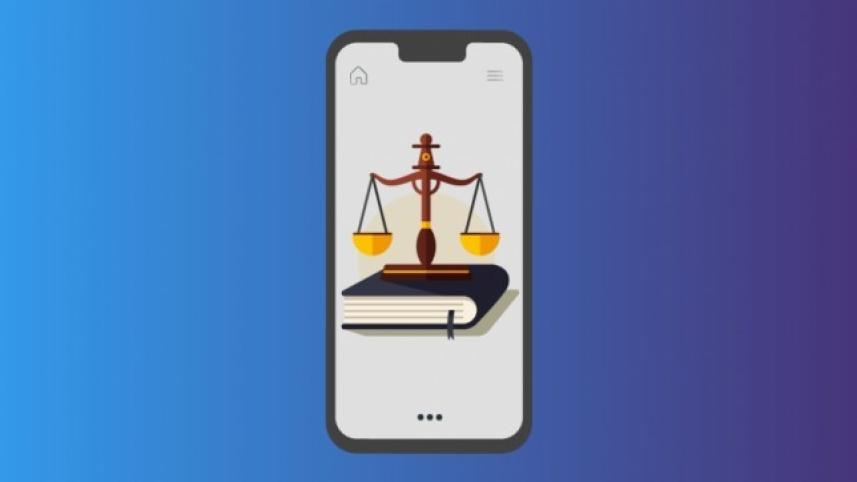Virtual court: New dimension in the judiciary

A laptop and a smartphone with internet access.
With these, Jamiul Hoque Faisal, a young advocate of the Supreme Court, was able to move a petition, place arguments before the High Court on May 17, and successfully bail out his client in a case filed under the controversial Digital Security Act.
From his home in the haor area of Kishoreganj, Faisal participated in court proceedings through videoconferencing.
Since March 18, Faisal had been staying at his village in the district's Nikli upazila, around 100km from Dhaka.
He was not able to return to the capital for two months because of the pandemic-induced shutdown that ended on May 31.
The regular activities of courts across the country, including the Appellate and High Court Divisions of the Supreme Court, remained closed since the last week of March. The SC had announced a two-week annual vacation on March 13.
Beginning on May 11, in line with an ordinance issued by President Md Abdul Hamid on May 9, virtual courts were introduced in order to deal with urgent cases after a gap of a month and a half.
The courts began to hold hearings of the cases and pass orders over the videoconferencing, without needing the physical presence of lawyers, the accused, and witnesses in one place.
Talking to this newspaper yesterday, Faisal said he moved three cases virtually before he returned to Dhaka on May 31.
He is still taking part in virtual proceedings while the court is functioning through videoconferencing after another two-week vacation began on July 24.
NEW CHAPTER
The lower courts across the country heard and disposed of a total 1,36,399 bail petitions and granted bail to a total of 67,229 accused, including 755 children, in the 50 working days between May 12 and July 23, according to a statement by SC spokesperson Md Saifur Rahman.
Between May 12 and July 23, 508 detained on criminal charges were sent to three juvenile development centres -- leading to a total of 870 children staying there, added the statement.
The SC statement also said the subordinate courts concerned have disposed of surrender-related petitions of the accused in 4,310 criminal cases -- granting bail to 11,796 accused and sending 938 accused to jails -- between July 19 and July 23.
More than 300 courts have passed bail orders after holding virtual hearings of the petitions.
The introduction of virtual court proceedings is a new chapter in the history of the country's judiciary, Law Minister Anisul Huq told The Daily Star on May 10.
During a virtual hearing on a writ petition on May 12, the High Court extended thanks to President Md Abdul Hamid, Prime Minister Sheikh Hasina, Chief Justice Syed Mahmud Hossain, and the law minister for launching virtual court functions.
Virtual court functions are the first step in establishing an e-judiciary in the country, observed Justice Obaidul Hassan, a judge of a High Court bench.
The High Court Division has held hearings on several bail petitions and some writ petitions filed as public interest litigation, and also issued several important directives through the virtual court.
Lawyers have to file petitions seeking necessary directives by emailing the courts concerned. They do not need to swear any affidavit for moving the petitions before the courts other than making an undertaking that the information they mentioned in the petitions are true and explaining the need for their urgent hearings, according to the practice directives issued by the chief justice.
On May 10, the chief justice issued 20 practice directives on virtual court functions in line with the Usage of Information and Communications Technology by Court Ordinance 2020.
According to the practice directives, the lawyers concerned have to print the petitions, scan them and send the documents to the courts and opposite parties before the hearing. After receiving the petitions, the judges of the courts concerned fix dates for hearings on the matters and they are then included in the cause list as per a serial.
The judges and lawyers participate in court functions as if they are physically there -- wearing formal coats and gowns. The judges sit in the courtrooms and the lawyers and court officials work from home during the proceedings.
Many lawyers, particularly young practitioners, welcomed the virtual court system when it was introduced.
Eminent jurist Dr Shahdeen Malik told The Daily Star on May 20, "It is a good beginning. The virtual court proceedings may be expanded to include other types of hearings and cases. However, it must be done slowly, gradually and in detailed consultation with the bar, bench, and ICT experts.
"We have to be careful about misuse and abuse of the virtual justice process. The expansion must be done slowly, in a well-planned way, and implemented carefully."

 For all latest news, follow The Daily Star's Google News channel.
For all latest news, follow The Daily Star's Google News channel.